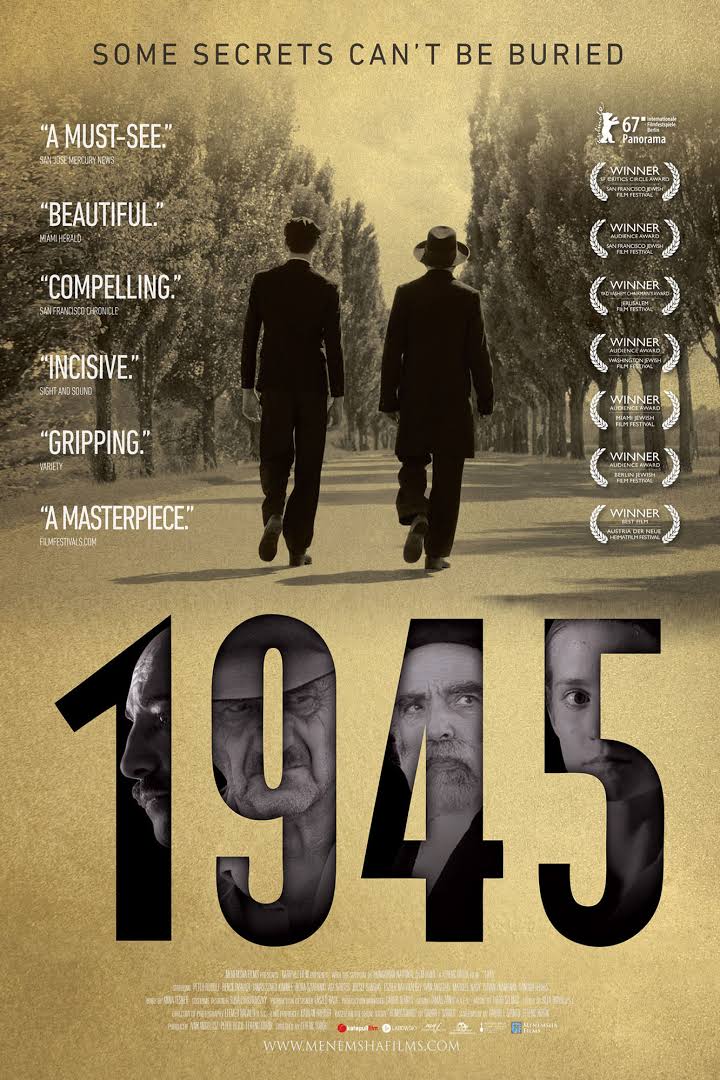Interview: Ferenc Török of "1945" on making a Western about the aftermath of WW2
 Saturday, November 4, 2017 at 5:00PM
Saturday, November 4, 2017 at 5:00PM 
On a summer day in 1945, an Orthodox Jewish man and his grown son return to a village in Hungary while the villagers prepare for the wedding of the town clerk's son. The townspeople – suspicious, remorseful, fearful, and cunning – expect the worst and behave accordingly. The town clerk fears the men may be heirs of the village's deported Jews and expects them to demand their illegally acquired property back.
In the new film 1945 director Ferenc Török tells the story of a society trying to come to terms with the recent horrors they’ve experienced, perpetrated, or just tolerated for personal gain. Based on the short story ‘Homecoming’ by Gábor T. Szántó and shot in gorgeous black and white cinematography, 1945 is a historically detailed drama that plays like a ticking clock Western. We recently spoke to Török in New York.
MURTADA ELFADL: I’m curious about the inception of the project. How did you come about it?
FERENC TÖRÖK: I read the short story by Gabor in 2004. It was visual without too much dialogue, but I thought there wasn’t enough for a feature. The timing especially was good - 1945 in the summer, after the war. It takes place in only a 2-3 hour span of time, like an old greek drama, Antigone or something. Like a western. I’ve always wanted to make a movie in real time with different points of view from different characters like a Robert Altman movie.
You mentioned westerns, I thought of High Noon while watching because of the ticking clock structure...
Yes the ticking clock and the train arriving. And the strangers on the train. And the suspense of course, like a thriller. The secret gossips in the town. At the end everything changes but everybody would remember these two hours.

What were some of your influences while working on this film?
I watched neorealism, Italian movies like The Bicycle Thief. Vittorio di Sica. Rossellini. I also watched Ingmar Bergman’s The Seventh Seal. And westerns particularly High Noon because of its simple structure that’s easily understood by everyone.
How was the collaboration on the script with Gábor T. Szántó, the short story writer?
We worked together. We decided on three points of view. The Jewish visitors coming to the village. The innocent point represented by the son of the clerk, who’s getting married so we get a wedding that wasn't in the short story. We gave more prominence to the guilty point of view, represented by the clerk, who was in the background in the short story.
Why add the wedding, what was the significance of that?
We needed a special and positive event. The war is done and the village wants to celebrate. It’s also an event that allowed us to bring more characters, women cooking, the priest who officiates, all the guests. The whole town.
The editing and the cutting between a just a few locations successfully builds the tension in the story. Can you talk about that?
It was quite a long editing process because we were looking for a good rhythm and for silence, dramatical silence, we cut out a lot of the dialogue. We used maybe 90% of the script so it wasn't improvised. It was not easy
What historical research did you do?
Half a million Jewish people in Hungary were deported and killed during the second world war. Mostly village people, religious Jews. We used lots of archival photos, documents and interviews. We listened to radio newsreels from the time.
Did you film in locations where some of these events happened?
We built up the locations because we couldn't find an intact village from 70 years ago. We found a real train station though. We used archival photos of North Hungarian villages to guide us.

Did you have time to rehearse with actors?
We talked with the actors during costume fittings. That’s an important time in the process. It’s a good time to talk and get comfortable with each other, to see how the characters fit together. I like getting intimate and personal with my actors. We swapped stories because we’ve all got families who lived through that time. They wanted to tell this story, it’s not just a job, but a mission.
Why film in black and white?
It was my first time shooting in black and white. My DP, Elemér Ragályi, is 80 years old. He was 5 at the time that this story took place, he has some atmospherical memory of that time. The story’s dilemma called for black and white. There’s also a renaissance of it, even Nike commercials are now shot in black and white. My children’s instagram has black and white filters. It exists and sometimes it’s the best way for the drama unfolding.
How was the reception for the film as you’ve played it around the world? Did it play differently at different countries?
We’ve already opened in Hungary and the film was quite a success there. 40, 000 admissions which is good for a black and white film. We were at the Panorama section in Berlin. There’s interest in this movie all over Europe not just Hungry or Eastern Europe, audiences have been saying that it’s their story too. The moral debt of the war is shared. Now we come to the US which of course has roots in Europe.



Reader Comments (2)
Nice to see this item and to know it's coming to the US. I saw it back in February. We screened it at my local film festival Film by the Sea in the Netherlands, where it won the Film & Literature Award.
one touch express provide internet connection in all over delhi upto 250mbps with fiber optics at only 599 plan